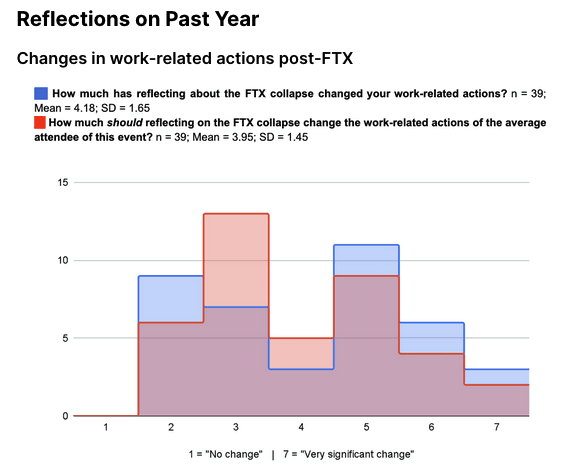A brief and belated update: When I resigned from the board of EV US last year, I was planning on writing about that decision. But I ultimately decided against doing that for a variety of reasons, including that it was very costly to me, and I believed it wouldn’t make a difference. However, I want to make it clear that I resigned last year due to significant disagreements with the board of EV and EA leadership, particularly concerning their actions leading up to and after the FTX crisis.
While I certainly support the boards’ decision to pay back the FTX estate, spin out the projects as separate organizations, and essentially disband EV, I continue to be worried that the EA community is not on track to learn the relevant lessons from its relationship with FTX. Two things that I think would help (though I am not planning to work on either myself):
- EA needs an investigation, done externally and shared publicly, on mistakes made in the EA community’s relationship with FTX.[1] I believe there were extensive and significant mistakes made which have not been addressed. (In particular, some EA leaders had warning signs about SBF that they ignored, and instead promoted him as a good person, tied the EA community to FTX, and then were uninterested in reforms or investigations after the fraud was revealed). These mistakes make me very concerned about the amount of harm EA might do in the future.
- EA also needs significantly more clarity on who, if anyone, “leads” EA and what they are responsible for. I agree with many of Will MacAskill’s points here and think confusion on this issue has indirectly resulted in a lot of harm.
CEA is a logical place to house both of these projects, though I also think leaders of other EA-affiliated orgs, attendees of the Meta Coordination Forum, and some people at Open Philanthropy would also be well-suited to do this work. I continue to be available to discuss my thoughts on why I left the board, or on EA’s response to FTX, individually as needed.
- ^
Although EV conducted a narrow investigation, the scope was far more limited than what I’m describing here, primarily pertaining to EV’s legal exposure, and most results were not shared publicly.


I think that would be worth exploring. I suspect you are correct that full Sarbanes-Oxley treatment would be onerous.
On the other hand, I don't see how a reasonably competent forensic accountant or auditor could have spent more than a few days at FTX (or at Madoff) without having a stroke. Seeing the commingled bank accounts would have sent alarm bells racing through my head, at least. (One of the core rules of legal ethics is that you do not commingle your money with that of your clients because experience teaches all sorts of horrible things can and often do happen.)
I certainly don't mean to imply that fraud against sophisticated investors and lenders is okay, but there is something particularly bad about straight-up conversion of client funds like at FTX/Madoff. At least where hedge funds and big banks are concerned, they have the tools and access to protect themselves if they so wish. Moreover, the link between the fraud and the receipt of funds is particularly strong in those cases -- Enron was awash in fraud, but it wouldn't be fair to say that a charity that received a grant from Enron at certain points in time was approximately and unknowingly in possession of stolen funds.
Thankfully, procedures meant to ferret out sophisticated Enron-style fraud shouldn't be necessary to rule out most straight-up conversion schemes. Because of the risk that someone will rat the fraudsters out, my understanding is that the conspiracy usually is kept pretty small in these sorts of frauds. That imposes a real limit on how well the scheme will withstand even moderate levels of probing with auditor-level access.
If you want a reference class of similar frauds, here is the prosecution's list of cases (after the Booker decision in 2005) with losses > $100MM and fraud type of Ponzi scheme, misappropriation, or embezzlement:
For example, one might be really skeptical if auditing red flags associated with prior frauds are present. Madoff famously had his audits done by a two-person firm that reported not conducting audits. FTX was better, but apparently still used "questionable" third-tier firms that "do audit a few public companies but none of the size or complexity of FTX." Neither "the Armanino nor the Prager Metis audit reports for 2021 provides an opinion on the FTX US or FTX Trading internal controls over accounting and financial reporting" -- and the audit reports tell the reader as much (same source). The article, written by an accounting lecturer at Wharton, goes on to describe other weirdness in the audit reports. Of course, that's not foolproof -- Enron had one of the then-Big Five accounting firms, for instance.
Catching all fraud is not realistic . . . for anyone, much less a charitable social movement. But it seems like some basic checks to make fairly sure the major or whole basis for the company / for the individual's wealth is not a fraudulent house of cards seems potentially attainable at a reasonable burden level.